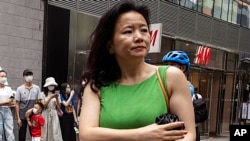One year after Beijing put an Australian journalist on trial in a closed-door hearing, China has still not revealed the verdict in the case.
The Australian government has expressed “deep concerns” over the delay in announcing the outcome of the national security trial of Cheng Lei.
Cheng, a television anchor at the Chinese state-run TV channel CGTN, was first detained in Beijing in August 2020 and later was accused of “illegally supplying state secrets overseas.” The closed-door trial took place on March 31, 2022.
Media analysts say the case underscores the alarming situation for media in China if even journalists who work for state media are at risk of being detained for lengthy periods.
“This goes to show how dire the situation for free expression is in China,” Angeli Datt, a China researcher at the free expression group PEN America, told VOA. “I don’t think you’re necessarily safer working for state media.”
On the one-year anniversary of Cheng’s trial, Australian Foreign Minister Penny Wong released a statement saying Canberra has advocated for Cheng to be reunited with her family, including her two children, and that they share the “deep concerns of Ms. Cheng’s family and friends.”
“Australia has consistently called for Ms. Cheng to be afforded basic standards of justice, procedural fairness and humane treatment in accordance with international norms,” Wong said in a statement. “We will continue to provide consular support to Ms. Cheng and her family, and to advocate for her interests and wellbeing.”
Australian diplomats were blocked from observing Cheng’s trial last year.
A spokesperson at China’s Washington embassy told VOA the diplomats were barred because “cases involving state secrets shall not be tried in an open court.”
“Our judicial institutions try cases in strict accordance with law and fully protect all lawful rights of the relevant individuals,” the spokesperson added via email.
The spokesperson declined to answer questions on why the trial’s outcome is delayed.
Cheng, an Australian national, was born in China and moved with her parents to Australia as a child.
She returned to China in 2003 to work at CNBC before joining CGTN in 2012, where she worked as a business news anchor.
Shortly after her arrest, the last two Australian media correspondents in China — Bill Birtles for Australian Broadcasting Corporation, and Mike Smith for the Australian Financial Review — left the country at the recommendation of Australian officials.
Cheng’s entire case has been characterized by the lack of public information about it, according to Yaqiu Wang, who researches China at Human Rights Watch.
“We don’t know what the charges are. It has been extraordinarily opaque,” Wang said. “The point is that we don’t know anything about her case, and looking from outside, there’s no reason she should be detained.”
Wang said she believes Cheng appears to have become “a political pawn for Australia and China relationship troubles.”
Australia and China have engaged in a trade war in recent years, and relations have been further exacerbated by China’s efforts to establish itself as a military presence in the Pacific.
Datt of PEN America said the case against Cheng has been characterized by the “complete denial” of due process rights.
Cheng was detained more than two and a half years ago, which Datt told VOA, is “an extremely long period of time to be held without some sort of verdict and maybe indicates that authorities don’t even know why they prosecuted her.”
To Wang, Cheng’s situation is further evidence of the repressive environment facing reporters inside China.
“I don’t think there’s any press freedom left in this country,” she said.
China is one of the leading jailers of journalists globally, with at least 43 detained for their work as of late 2022, according to data from the Committee to Protect Journalists. Two of those are foreign nationals, the data shows.




